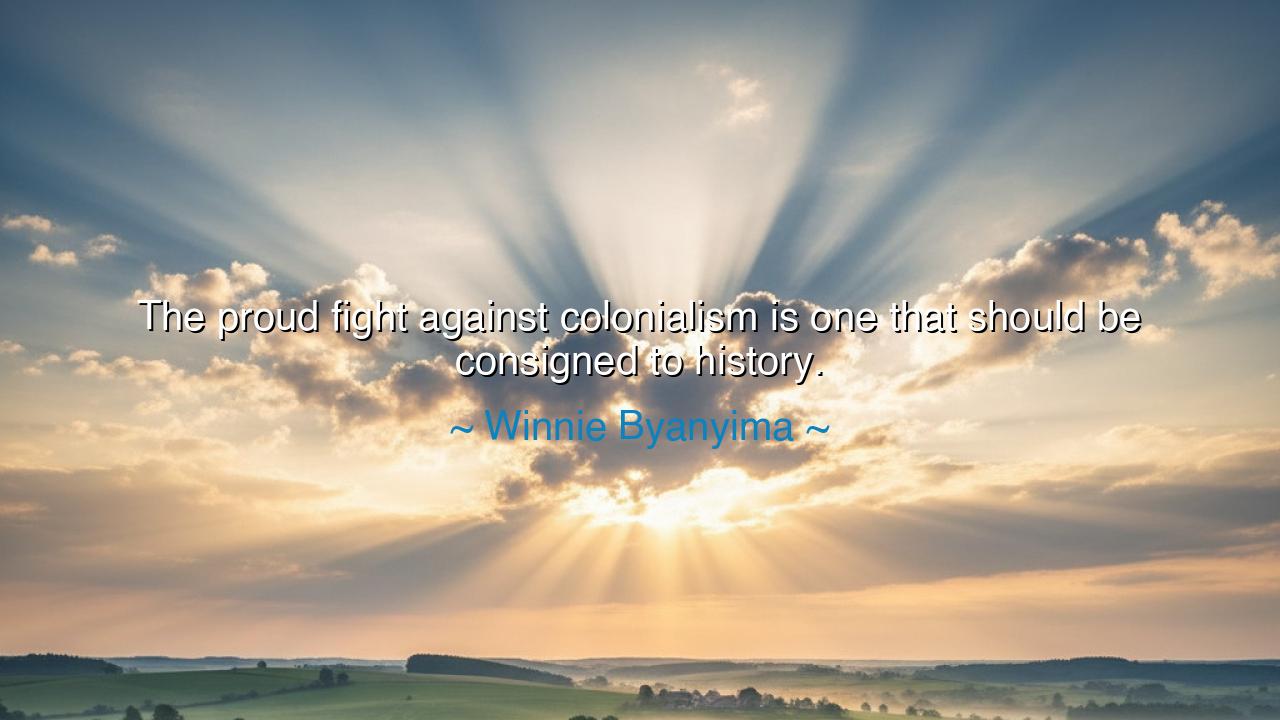
The proud fight against colonialism is one that should be






“The proud fight against colonialism is one that should be consigned to history.” – Winnie Byanyima
Thus spoke Winnie Byanyima, the Ugandan leader, diplomat, and champion of justice, whose voice has long carried the fire of Africa’s conscience. In these words, she calls not for the forgetting of the past, but for the fulfillment of its promise — for the struggle against colonialism to become not a lingering wound, but a completed chapter. Her statement is not surrender, but transcendence. She speaks as one who honors the warriors of freedom, yet knows that the time must come when a people cease to define themselves by what they have overcome, and begin to define themselves by what they shall build.
The meaning of her words unfolds like dawn upon the mountains. To consign the fight against colonialism to history is not to deny that it happened, nor to silence the memory of its heroes. It is to declare that the age of resistance must give way to the age of creation. The chains have been broken, and the question now is not how to escape the oppressor, but how to govern with wisdom, how to rise in unity, how to turn suffering into strength. Byanyima calls upon her generation and those after to shift from the rhetoric of liberation to the labor of nation-building, from bitterness to purpose. The struggle has earned its honor; now it must rest, so that new struggles — against poverty, inequality, and ignorance — may begin.
To understand her meaning, one must recall the story of Africa’s awakening in the twentieth century. For centuries, the continent groaned beneath the yoke of imperial rule — her lands divided by foreign lines, her people exploited, her dignity denied. Yet through courage and blood, freedom came. Nations rose: Ghana, Kenya, Nigeria, Uganda, Tanzania — each casting off the crown of empire. But the shadow of colonialism lingered still, not in law, but in mind and system. Too many leaders carried forward the habits of their conquerors; too many citizens saw freedom as an end rather than a beginning. Byanyima’s words are born from this realization — that independence must mature into sovereignty of spirit, that the work of freedom is not finished when the flag is raised, but when the people are truly empowered.
Consider the tale of Nelson Mandela and South Africa. For decades, the struggle against apartheid burned as one of the fiercest battles for liberation. Yet when victory came, Mandela did not dwell in vengeance or rage. He spoke instead of reconciliation, of moving forward. He turned the cry of resistance into the language of unity. In this way, he consigned the “fight” to history, even as he carried forward its lessons into the future. This is what Byanyima means: that freedom must evolve, or else it withers. If the mind remains chained to the memory of oppression, even liberty becomes a kind of prison.
And yet, there is reverence in her tone — for she knows that the “proud fight” is sacred. It cannot be erased, only completed. To consign something to history is to seal it in honor, to recognize that its purpose has been fulfilled. The fighters, the dreamers, the martyrs — they have done their work. Their courage has purchased a new dawn. But the living must not dwell forever in yesterday’s struggle. The call now is to guard the independence that was won, to ensure that it does not crumble from within, to replace the colonial master not with corruption or division, but with justice and equality.
Byanyima’s wisdom reaches beyond Africa, for every people, in every age, faces a version of her truth. The wars of the past, the wrongs of ancestors, the pains of history — these must be remembered but not relived. There is a time to fight and a time to rebuild. The ancient prophets spoke likewise: the sword must one day be beaten into a ploughshare, the hand that once struck in defense must now sow the fields of peace. Only then does history truly move forward. Only then does freedom become real.
So, my child of the new world, learn this lesson: honor the struggle, but do not live in it. Study the past not to reignite old wars, but to draw from it the strength to create something greater. Let the fight against colonialism, against all forms of tyranny, stand as a monument — not as a battlefield renewed. Your duty now is not to destroy, but to build; not to divide, but to unite; not to remember in anger, but to remember with purpose. For the proud fight has already been won — and the true measure of victory lies not in how fiercely we fought, but in how wisely we now choose to live.






AAdministratorAdministrator
Welcome, honored guests. Please leave a comment, we will respond soon